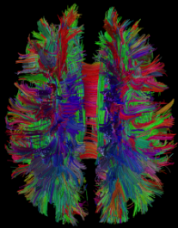
In the Light of Evolution VI: Brain and Behavior
 January 19-21, 2012
January 19-21, 2012
Arnold and Mabel Beckman Center
Irvine, CA
Darwin never wrote much about the brain, but Darwin’s nemesis, Richard Owen, tried in 1861 to protect humans from Darwin’s threatening ideas by arguing that human brains differ fundamentally from those of other apes. This argument provoked a spirited attack by Darwin’s “bulldog,” T. H. Huxley. Darwin did not comment publicly on this controversy, but for the second edition of his Descent of Man, Darwin asked Huxley to write an essay “on the resemblances and differences in the structure and the development of the brain in man and apes.” This essay was a forceful attack on Owen’s argument and showed convincingly that human brains are like fairly typical ape brains, although larger. Thus the Darwinians began to contemplate evolving brains. This colloquium surveyed what has been learned about brain evolution in the 150 years since the Owen-Huxley debate, bringing together leading scientists whose work illuminates the twin questions of how and why complex nervous systems evolved.
Session I. Brains in History: Descent with Modification
Chair, John C. Avise, University of California, Irvine
- Evolution of Brain Development, Georg Striedter, University of California, Irvine
- Evolution of Neuronal Cell Types, Nipam H. Patel, University of California, Berkeley
- Homology and Homoplasy of Behavior and Neural Circuits, Paul S. Katz, Georgia State University
- Evolution of Cognitive Traits, Lucia F. Jacobs, University of California, Berkeley
Session II. Brains in Ecology: Adapatation by Natural Selection
Chair, Georg Striedter, University of California, Irvine
- Adaptation of Neuron-typical Molecules and Processes, Harold H. Zakon, University of Texas, Austin
- Evolution of Specialized Sensory Systems, Kenneth C. Catania, Vanderbilt University
- Evolution of Specialized Motor Systems, Andrew H. Bass, Cornell University
- Evolving Neural Mechanisms of Social Diversity and Cognition, James L. Goodson, Indiana University
Keynote Address
Introduction, Francisco J. Ayala, University of California, Irvine
Evolution of Centralized Nervous Systems, R. Glenn Northcutt, Scripps Institution of Oceanography
Session III. Evolving Piece by Piece: Levels of Modularity in Neurobiology
Chair, Lucia F. Jacobs, University of California, Irvine
- Molecular Models in Neurobiology, Kenneth S. Kosik, University of California, Santa Barbara
- Devolpmental Modules in Nervous Systems, Leah A. Krubitzer, University of California, Davis
- Neuroanatomical and Physiological Modules, Jon H. Kaas, Vanderbilt University
- Modularity of Cognitive Processes, Jessica F. Cantlon, University of Rochester
Session IV. Human Evolution: Brains and Behavior
Chair, Francisco J. Ayala, University of California, Irvine
- Molecular Aspects of Human Brain Evolution, Todd M. Preuss, Emory University School of Medicine
- Evolution of Primate Brain Morphology, Suzana Herculano-Houzel, Universidade Federal do Rio de Janeiro
- Evolution of Primate Brain Functions, Lizabeth M. Romanski, University of Rochester
- The Evolution of Human Cognition, Clark Barrett, University of California, Los Angeles
Concluding Remarks
Francisco J. Ayala, University of California, Irvine

